#Beneficiary objections
Explore tagged Tumblr posts
Text
Removing the Personal Representative of an Estate
In this article, we’re talking about removing the personal representative of an estate. This is another type of estate litigation that involves probate. Estate litigation is any type of litigation that involves probate, trusts, and wills. The Gormley Law Office is an experienced probate law firm that handles all things probate in Washington, DC, and Maryland. We’re here to help, and the…

View On WordPress
#Beneficiary objections#Breach of duty#Conflict of interest#Court petition#Disqualification#Estate administration#Estate Litigation#Executor#Fiduciary Duty#Grounds for removal#Incompetence#Legal proceedings#Mismanagement#Personal representative#Probate Court#Removal hearing#Removal process#Successor personal representative#Surrogate court#Trustee
0 notes
Text
One of the two bills approved by the Knesset, with a 92-10 majority, legislates that Unrwa will no “longer operate any institution, provide any service, or conduct any activity, whether directly or indirectly” within the territory controlled by Israel. This includes the Palestinian territories occupied since 1967, where almost three million Palestinians are registered as refugees, and hundreds of thousands are beneficiaries of life-sustaining services. The second bill abrogates the 1967 agreement between the United Nations and Israel, which allowed Unrwa to extend its services within the occupied Palestinian territories, with Israel committing to facilitating the agency’s work. This measure also strips Unrwa of its diplomatic immunity. Attacks on Unrwa have multiplied during the last decades, reaching unprecedented intensity after 7 October, with more than 230 staff killed in Israeli strikes. The ultimate objective of Israel’s campaigns to erase Unrwa has always been to erase the international legal protections in which the United Nations has enshrined the Palestinian right of return to the lands from which they have been expelled.
[...]
In effect, what the laws ultimately do is to translate Israel’s genocidal intent into national law. It is not a matter of individuals with high-rank positions, or chains of command explicitly articulating and implementing the intent to destroy Palestinians as a group. With the new laws, it is the supreme “democratic” organ governing the state of Israel which has voted in favour of directly contributing to settler-colonial expansion and genocide by eradicating the main institution that keeps Gaza Palestinians alive.
30 October 2024
538 notes
·
View notes
Note
I had my car’s battery die the other day (still don’t know why) and I thought it would be cute if the same thing happened to reader… so like maybe she’d be on the phone with Remus and Sirius be like “my car died which sucks lol” and he’d leave work early just to help her jump start her car 😍
Sorry about your car battery babe! That used to happen to me all of the time. I wasn't quite sure who you wanted the love interest to be in this one, but since you mentioned both Remus and Sirius I went with poly wolfstar, hope that's alright <3
poly!wolfstar x fem!reader ♡ 757 words
When Remus arrives home, you seem to be bickering at Sirius while he rifles through his trunk.
“I know he said they were in here somewhere.”
“Your manager is going to be so upset with you,” you fret. “I could’ve caught the bus.”
“Yes, but why would you when you have a perfectly good car and a perfectly capable boyfriend?” Sirius turns to toss one of his flippant grins at you, and he catches sight of Remus coming up behind him. “Hello.” He greets him with a kiss, pleasantly surprised. “I didn’t know you were walking home, love, I’d have picked you up.”
“It’s fine,” says Remus. “I thought you were at work.”
“He was.” You seem unable to choose between feeling cross with Sirius and guilty with yourself, but you’re definitely distressed. “He left work early, just because I texted you guys.”
“You know,” Sirius drawls, “some people want a partner who would drop everything to come help them.”
“I wouldn’t have said anything if I’d known you were going to leave work!”
Remus understands your upset. Sirius is perpetually on thin ice with his manager—who, in Remus’ completely unbiased opinion, is a tyrant who expects far too much sacrifice from his employees—and Remus would feel bad too if he further jeopardized Sirius’ job by accidentally calling him away from work early. But also, you’re going to be late for work if you can’t get your car started.
“You need his car here to get a jump, dove,” Remus says. He can feel Sirius’ smugness like an aura about him, but Remus ignores it.
You sigh, resigned but dispirited. “You didn’t have to come home, either. I was only complaining to complain.”
Remus smiles and stretches out his arm. You fit yourself under it automatically. “I wanted to see if I could help,” he murmurs, kissing the top of your head in greeting. “Don’t be upset, okay?”
You’re easily mollified by a soft touch and a loving tone. “Okay,” you mumble. Remus kisses your head again in thanks.
“Alright.” Sirius stops digging around in the trunk, spreading his hands helplessly. “Are we sure we ever had jumper cables?”
“We do,” Remus says. He lets you go to join Sirius, showing him the compartment where the spare tire and other essentials are kept.
“Oh, a secret extra trunk. Excellent. Now, does anyone know how to use these?”
Remus has always been a public transportation beneficiary and Sirius was raised posh, so the three of you end up cloistered around Sirius’ phone watching a video about how to jump start a car.
“Seems easy enough,” says Sirius. “So, we start my car first, then?”
“We start neither car before all the cables are attached,” you say, while Remus gives his boyfriend a worried look.
“It seems important that we do everything in order,” Remus agrees. “Considering we’re working with electricity and such.”
None of your objections seem to put a dent in Sirius’ confidence, however. Though nothing you’re doing involves working with grease, he takes his work shirt off “to keep it from getting dirty” and ties his hair back. It’s all rather dramatic, Remus knows, but he can’t find it in himself to protest. Neither can you, apparently.
“Okay, so that one goes on the positive one.”
“Right.” You tear your eyes from your boyfriend’s tattooed abdomen, visibly forcing yourself to concentrate on the battery. “Uh…”
“The one with the plus sign, doll.”
Sirius’ eyes dance with mirth, but he delivers the instructions patiently until both cables are connected and Remus is turning the ignition in Sirius’ car.
“Okay, now yours!” Sirius calls to you.
Remus hears the croaking sounds of your car trying to start, but then the engine roars to life.
“Beautiful!”
Remus gets out of Sirius’ car to see you beaming at each other, your upset over his leaving work clearly forgotten. Sirius looks like he’s about to pat your car approvingly, so Remus catches his hand before he can burn himself. Sirius appears not to notice the interception, only squeezing his boyfriend’s hand excitedly.
“I’ll pull out of your way so you can get out of here,” Sirius says, backing towards his car.
“Wait!” Your door opens, and you come running out. “Just one thing first.”
You take Sirius’ face in your hands, planting a heavy kiss on his lips. He looks half dazed when you pull away and come for Remus, your mouth warm and sweet on his.
You break away with a giant grin on your face. “Thanks,” you say breathlessly.
#poly!wolfstar#poly!wolfstar x reader#poly!wolfstar x fem!reader#poly!wolfstar x y/n#poly!wolfstar x you#poly!wolfstar x self insert#poly!wolfstar fanfiction#poly!wolfstar fanfic#poly!wolfstar fic#poly!wolfstar fluff#poly!wolfstar imagine#poly!wolfstar scenario#poly!wolfstar drabble#poly!wolfstar blurb#poly!wolfstar oneshot#poly!wolfstar one shot#remus lupin#remus lupin x reader#sirius black#sirius black x reader#wolfstar x reader#marauders#marauders fanfiction#marauders fandom#the marauders#hp marauders#remus lupin x sirius black x reader
598 notes
·
View notes
Text
Reasons why I, a sighted person, enjoy and benefit from seeing image descriptions:
Sometimes I'm not confident in my interpretation of a facial expression, and the ID can offer clarity
They might highlight details I otherwise wouldn't have noticed
Especially in the case of artist-described works: they might indicate a character's race/ethnicity that I otherwise couldn't tell for sure
Likewise, they might describe cultural details (food, clothing, hairstyle, etc) that I otherwise wouldn't have known the word for
Likewise, again: the same, but for terms for disability aids
Sometimes my internet is slow, and images don't load for me
Sometimes I have my screen brightness turned way down (sometimes due to eyestrain, sometimes due to low battery)
The activity feed doesn't show images, so sometimes a reblog notification starting with "ID: ..." is the only way I realize someone added a quality meme or some peer-reviewed tags to one of my posts
Sometimes my brain is just tired and reading words is easier than interpreting visual cues.
And maybe one of the most important ones:
While currently, my glasses completely correct my vision, I know that in the future, there might come a time in which I need — at the bare minimum — text from images transcribed in a format where I can adjust the font size.
And for that matter, you might need similar accommodations someday, too.
There are, of course, people who need these accommodations now, and that alone is more than enough justification to include image descriptions immediately, to start caring about accessibility immediately. Even if the pool of ID "beneficiaries" was only limited to blind/low vision people, and if it was a group of which the size would never increase, then online accessibility would be just as important.
But, in fact, there's a wide range of people for whom IDs are useful, to varying but objectively all valid degrees. And as the internet userbase ages, the proportion of disability will absolutely rise. After all, we're the largest marginalized group that anyone can join at any time!
Or, in other words: if your indifference to IDs stems from thinking that no one in your internet circle needs them, and/or thinking that you in particular will never need them? It's never too late to reconsider those assumptions. Here's some resources.
915 notes
·
View notes
Text
As I sit here at my two hour Spravato treatment, I’m thinking about how we talk about depression and whose job it is to do scicomm and health comm about depression.
I’ve had clinical suicidal depression for 24 years, I’ve been in therapy, done inpatient, taken meds, done treatments. I know a lot about it and can help people with the process. I love being a resource for friends new to navigating the options.
But I don’t want to be The Depression Person. Depression is just some background noise that gets in the way of who I actually am. I wanna talk prairie and plants and history!
I hate talking about my depression and suicidiality. I don’t care about receptors and inhibitors and brain chemistry. I don’t want to make work about it. I get rip-roaring furious talking about anti-medication activism, discourse and stigmas around getting help. I have zero interest in getting into it about The Psychiatry Industry, pharmaceuticals, or insurance.
So what action should I take? As a beneficiary of this complex and nuanced field of depression treatment, as a person who uses images to communicate, what am I morally obliged to do? Should I use my experience to educate people? Wouldn’t that make me a corpo shill? A pharma shill? A psychiatry apologist?
I hate that objective, concrete quality of life improvements I have had will be met with hostility and bad faith responses. I���m afraid of the inevitable backlash any depression treatment educational material I make will have. This seems especially pertinent as we in the US are going to have RFK, a man who has explicitly targeted antidepressants, as part of our government. What is my obligation here? What is the right thing to do?
Idk man. I just want to draw and talk about plants. But it sure would have been nice if I had known any of this depression stuff like, a decade earlier.
190 notes
·
View notes
Text
Something I really love - as I was discussing with @aysekira - is how the drama is subtly showing how messed up the polygamous wife/concubine system is.
You can see it of course vis-a-vis ML, who is a talented ambitious man held back by his birth in terms of his mother's (lack of) rank but it's even more stark with the regard of Lady Qiao's children. Her daughter has consistently been portrayed as scheming towards FL and almost caused her grievous harm but she's not a one-note villain (neither is her mother, but that's a separate topic.) She is a genuinely loving daughter to her mother and loving sister to her full blood brother - she is willing to sacrifice for them both. We don't see the brother much but he also seems a loving son to his mother and brother to his full blood sister. It is quite clear by now that in a monogamous family situation, both the siblings and the mom would have behaved decently enough and had a loving enough family unit. They are warped by the family.
And Lady Qiao - she may be awful in many ways but she is a deeply loving, sacrificing mother for her children (more than can be said for her "noble" husband.) She'd have been fine in a different situation. And she has a valid grudge - scumbag dad promised to marry her as a legitimate wife before he married FL's mom. And then to promote her before he married wife n2. And did neither. Now, his mother objected but (a) that is why you should not promise if you know you won't be able to carry it out or (b) then you should fight to fulfill what you promised. No wonder she's bitter.
That is a household full of messed up, wounded, unhappy people - there is a reason that the most functional and happy member of the family is FL who lived apart since childhood.
The only one truly happy is the dad - his first and second wives had a bad time, Lady Qiao did too, his children all suffered at one time or another but he? He's got a woman he fancies, another woman who pays for it all, and he's the boss. All those miserable people and the only beneficiary is him.
And the thing is - any family can have issues, bad spouses, golden child/scapegoat dynamics, but when you have polygamous marriages of mad power imbalance, it supercharges the potential for it all. Take ML - he is a smart, properly- behaved dude. But his mother's status is what it is, and dad doesn't like him so he's basically at the bottom of the family hierarchy. And granny doesn't like him either - she claims it's because he was not an endearing child (which btw is insane - your own biological child or grandchild doesn't have to earn your love - they should be loved just because they exist; not to mention to be able to coax adults just so in his situation would be a sign of manipulative sociopathy, not awesomeness.) But she also doesn't try hard either - she actually seems largely indifferent to all her grandkids male and female except for FL -and in a status type polygamous society where other women are in favor or have higher status and thus their children do - unless he has someone powerful (in terms of within the family) in his corner, he's screwed and that is viewed as totally acceptable - he even learns in secret!
It's pretty telling that his position in the family only starts slowly changing when the favorite granddaughter, and the most high status one, stands up for him and decides to be in his corner. I do love watching him being gradually dragged into the family and softening because FL is making some other members like him more - when the story starts there is nobody in that fam he can do more than tolerate - he views them, understandably, as a bunch of unpleasant strangers he dwells with. But by now he loves FL, he likes sixth miss and little uncle and stepmom and while he doesn't like grandma he'd protect her because she's important to FL. He is a sane person who treats others well if they treat him well, but he is not gonna care for someone just because they are blood.
One last point - I love that he finally has someone who puts him first. FL consistently aims to protect him and to take care of him (whether in the physical try to cover him during an attack way or metaphorical - working to put him on the registry - the way he can't believe it and yet she does and he watches her work on it methodically!) but also she views him as someone smart and capable and someone she should learn things like calligraphy from - for someone who's been viewed as the bottom of the totem pole to be viewed as competent (and in the traditional status subjects at that) and someone who should be teaching her is actually pretty huge. When he teaches her calligraphy, she tries to wheedle out of work and what not but even doing that is implicitly acknowledges that he has authority in the subject (because she could always be - you can't make me, who are you.)
Anyway, to get back to dad, I hope he rots!
63 notes
·
View notes
Note
You wanna know who the #1 beneficiary of the tech power creep is in this series? Momo. One thing this mech suit shows is that Momo totally wasted her time trying to beat people with sticks. The idea of trying to create items in a battle as a form of problem solving is stupid, or at best, should be done as a last resort. Her power was always meant for technology. That's the true power in this world. She should have been trying to be Ironman. You know how All Might spent his fortune on the suit, and that was meant to be a limiting factor as to why this tech can't be widely used? Well, guess who has the ability to generate materials with no cost. Even the idea of her inventions requiring studying to make things more complex stops holding water when you look at the torture device she tried to strap Midoriya into during Class A vs Deku. She made that in an instant and it posed an immediate threat. What could she make if she wasn't trying to do it during stressful battles with enemies right in front of her? So, her limiting factor really is her ability to study advanced concepts and have people explain them to her, and most importantly, what an author is willing to let her do. The path forward for her was always to pay people smarter and more educated than her to invent things and then she can have them explain it to her so she can recreate it. If her family had paid the cost to design that Iron Might suit, then she'd pay it. Once. And then be able to use the schematics to create as many of them as she wants. Or better yet, make killer robots except use the tech inside of the suit. Create an entire army of them so she never has to be in any sort of danger at all. Control them remotely. UA has been shown to have advanced AI robots who have personalities. Said bots have enough restraint to never kill any of the kids in the sports festival or entrance exam. This could be used for hero work. This also gets into what a valuable resource Mei Hatsume is and how if you wanted Momo to be a god, you could just have them meet in middle school. Mei just has to design a working device, once, and then Momo can study it and forever use it. What could she come up with, if the idea was that Momo would hide somewhere, perhaps in an APC, while she uses drones and robots to fight at a distance? Energy/food costs for her also aren't a concern. She's clearly able to output more energy than she takes in, given she can create cannons and things that weigh more than her. So she could use up all of her lipids creating a dead meat cube that contains as many calories as she's capable of packing into an object, then eat it. And repeat this process as needed.
This is definitely interesting.
Momo absolutely has the potential to be the most OP in the series. Horikoshi originally wanted to give her quirk to a pro but recognized that someone experienced would nerf the entire story.
I don't necessarily think that making things for problem-solving is the issue; I think it's way more that Horikoshi just didn't have the creativity for it. Like you said the entrapment device she made during 1A vs Izuku was maybe her most effective creation. Instead of disinfectant, imagine she made poison gas and simply knocked Kendo and the other 1B students out (not sure if she can create chemical reactions, but she could theoretically cause one by using components right).
I doubt she would be comfortable doing next to nothing as a hero. I do wish we knew her motivations, but relying purely on her money while doing minimal work doesn't paint a great picture for her. I like that in canon she doesn't rely on her status or wealth for hero work, she relies on her intelligence.
Momo should be an underground hero. She could be the equivalent of Batman (no this isn't my love for Batman over Iron-Man talking), strategizing and having any gadget she needs at her disposal. I would love to see more tech incorporated into her work as a hero. I also wouldn't mind the bo staff if she was allowed to actually use it like a bo staff (seriously she barely does anything with it what's the point of giving it to her. Nah give my girl a sword and let her cut people)
48 notes
·
View notes
Note
I used to like sns but now it's the ship I hate the most, every day is a post how Sasuke is an angry twink whose only cure is naruto dick or calling him a misogynist gay who hates and despises all women
I had sort of the same experience with SNS actually. I used to be pretty into the ship, but the more time I spent looking at the story, the less it appealed to me. I think my initial enjoyment of SNS came mostly out of convenience, in the sense that Naruto used to be my favourite character and the ship leans into a lot of beneficiary elements for him. When you have a character you've become particularly attached to it's sort of intrinsic that you'd want to indulge them, and SNS was a bit of a 'have your cake and eat it too' thing I suppose.
Anyway, I think for a lot of people who aren't really interested in looking at the socio-political framework of Konoha and how Naruto chooses to contribute to it; and moreover don't really care about the context behind Sasuke's actions and the reality of his position in Shinobi society; it's easy to accept and perpetuate the idea that Naruto saved Sasuke from the nebulous darkness of his anti-establishment philosophy because that's what the narrative espouses at the end of the day. I can't really speak on how the anti-Konoha part of the fandom that do ship SNS perceives their relationship because I have no experience really engaging with that content. I do know that it's sort of an accepted condition that their relationship isn't healthy, and I get that that's an attractive factor to people in shipping too, so to each their own I guess.
I wouldn't really say I'm staunchly anti-SNS because, objectively, I can see why it appeals to people. Personally, I just find it a bit off-putting in my perception of the narrative and its conclusion. I honestly dislike how Naruto and Sasuke's relationship is written in the latter half of Shippuden. I feel that purporting the idea that they always perfectly understood each other is kind of counterintuitive to introduce at the end of a story about both of them making choices that separated them because they didn't understand each other. It generally makes no sense to me, and also I think it undermines a lot of the development their relationship had in the original series. I guess what it comes to for me is I can't enjoy a romantic interpretation of Sasuke and Naruto's relationship any more because having the story end with Naruto getting everything he wants while Sasuke loses his autonomy and his pursuit of justice against Konoha to actualise that ending for Naruto makes me uncomfortable. I find it unrealistic to Sasuke's characterisation, and I dislike the narrative that forgiving Konoha is an act of moral absolution that Sasuke has to take part in to better himself.
I do also find the common sentiment that Naruto saved Sasuke from himself discomforting. There's an aspect of considering the harm Sasuke was doing to himself when making the choices he did, but frankly I think that could have been addressed and resolved without Sasuke needing to become an agent of the institution that obliterated his life, it feels like that component was more a benefit to Naruto's happy-ending than anything else. The fandom predominantly has a very strange idea of Sasuke's character, so I guess It's just not really that interesting to most people to question whether Sasuke's concluding compliance with Konoha's ideology actually made sense for his arc. And for the people that do, well again I don't really seek out SNS content any more so I'm a bit unclear on how their relationship works in an anti-Konoha reading of the story. In general, I have no interest in policing what anyone ships, I just can't really see SNS as a gratifying construal of Naruto and Sasuke's relationship.
If you want to read a better analysis, you should check out this post though. It's a lot more in depth than anything I've written here and sums up pretty much my entire stance on SNS in a more articulate way lol.
19 notes
·
View notes
Text
句法学 - Syntax
词类 cílèi / 词性 cíxìng - Parts of speech
名词 míngcí - Noun
动词 dòngcí - Verb
形容词 xíngróngcí - Adjective
副词 fùcí / 状语 zhuàngyǔ - Adverb
前置词 qiánzhìcí / 介词 jiècí - Preposition
后置词 hòuzhìcí - Postposition
连词 liáncí - Conjunction
代词 dàicí - Pronoun
限定词 xiàndìngcí - Determiner
句法功能 jùfǎ gōngnéng - Syntactic function
主语 zhǔyǔ - Subject
谓语 wèiyǔ - Predicate
宾语 bīnyǔ - Object
语序 yǔxù - Word order
格 gé - Case
主格 zhǔgé - Nominative
宾格 bīngé - Accusative
与格 yǔgé - Dative
属格 shǔgé - Genitive
具格 jùgé - Instrumental
题元角色 tíyuán juésè - Theta roles (语义角色,语义关系,主题关系)
施事 shīshì - Agent
受事 shòushì / 客事 kèshì - Patient
主事 zhǔshì - Theme
感事 gǎnshì / 经验者 jīngyànzhě - Experiencer
益事 yìshì - Beneficiary
领事 lǐngshì - Recipient
终点 zhōndiǎn - Goal
工具 gōngjù - Instrument
Syntactic structure
中心语 zhōngxīnyǔ - Head
附加语 fùjiāyǔ - Adjunct
标定语 biāodìngyǔ - Specifier
论元 lùnyuán - Argument
补足语 bǔzúyǔ - Complement
短语 duǎnyǔ / 词组 cízǔ - Phrase
句子 jùzi - Sentence
分句 fēnjù - Clause
从句 cóngjù - Subordinate clause
(句子)成分 (jùzi) chéngfen - Constituent
Theoretical terms
管辖 guǎnxiá - Govern
约束 yuēshù - Bind
移位 yíwèi - Movement
语迹 yǔjì - Trace
拷贝 kǎobèi - Copy (n.)
提升 tíshēng - Raising
控制 kòngzhì - Control
合并 hébìng - Merge
辖域 xiáyù - Scope
一致 yīzhì - Agreement
特征 tèzhēng - Feature
投射 tóushè - Project (v.)
扩充的投射原则 kuòchōngde tóushè yuánzé - Extended projection principle
语段 yǔduàn - Phase
语段不可渗透性条件 yǔduàn bùkě shèntòuxìng tiáojiàn - Phase impenetrability condition (PIC)
句法树 jùfǎ shù - Syntax trees
节点 jiédiǎn - Node
姐妹节点 jiěmèi jiédiǎn - Sister nodes
母节点 mǔ jiédiǎn - Mother node
女节点 nǚ jiédiǎn - Daughter node
终端节点 zhōngduān jiédiǎn - Terminal node
支配 zhīpèi - Dominate
Theoretical frameworks
生成语法 shēngchéng yǔfǎ - Generative grammar
X' 理论 lǐlùn - X-bar theory (also X次理论)
管辖与约束理论 gǔanxiá yǔ yuēshù lǐlùn - Government & binding
词汇功能语法 cíhuì gōngnéng yǔfǎ - Lexical functional grammar
依存语法 yīcún yǔfǎ - Dependency grammar
#中文#汉语#mandarin#mandarin studyblr#langblr#chinese langblr#词汇#syntax#chinese vocab#mandarin vocab#句法#vocab#句法学
71 notes
·
View notes
Note
Hi just waited to say that I love your redesigns/rewriting so much that now when I think of the hellavers the canon one is erased from my head and think only of yours💜💜 I especially like the idea of making overlords humans who made deals with devil/sins/goetias,I'm curious how Lucifer is in this version too. As a question when it comes to the form of the sinners like giving them animals or objects features, in your rewriting, is it connected to the main sin the sinners did when alive or something else?
Okay first off thank you so much omg ❤️❤️❤️❤️
Second, I haven't thought of Lucifer much, but from what I have done for him, he's just his show version without depression and he's had an unhealthy dosage of confidence injected into him. He and Charlie are in no way related in my version, just so that's clear. He becomes a beneficiary of the hotel later on specifically because he thinks of two different outcomes. A) Charlie's idea works and now heaven gets to suck it or B) It doesn't work and he gets to pop in and mock this dumb little angel for thinking it ever would. I imagine he does act fatherly to Charlie, but in a condescending way, treating her like a stupid child he wants to coddle instead of a grown adult with an idea. He's also not a sad boy dreamer because that's stupid. He genuinely believes he's the best thing that ever happened to Heaven and they're missing out because they couldn't handle him and kicked him out.
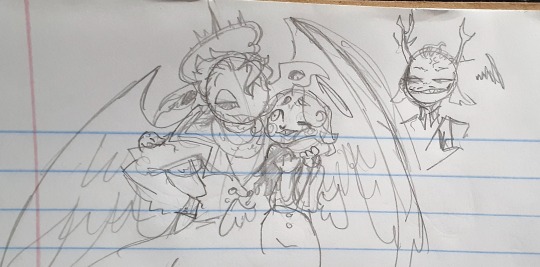
He also still hates Alastor, not because of the battle of the dads thing in the show, but because Alastor's arrogance grinds Lucifer's gears. Like, Lucifer is a cocky piece of shit and he knows it, but seeing someone else try to carry themselves like that annoys him to no end.
For his design i just doodled a bit and gave him a halo with crown bits - actually i stole that from my design of Lucifer for my own thing. I just wanted him to look like a goofy guy.
Okay sorry that was a lot, onto the second bit. I'm not really sure how the animal/insect/sinner designs work but they definitely correlate to the person's life beforehand. Like, Niffty for example, in her life she hated filth and bugs and when she died her house was a hoarder mess, and now in death she's a literal roach. I like the idea that the universe itself enjoys irony. Or maybe the designs are specifically to torment the sinners.
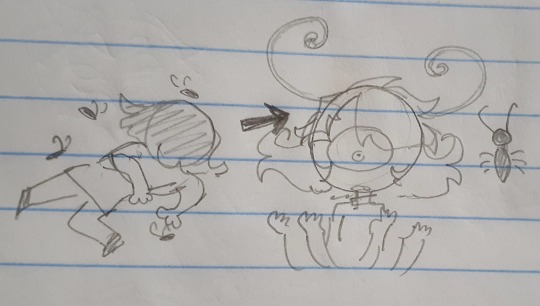
Anyhow sorry that was a lot of words. Thanks for the ask!
77 notes
·
View notes
Text
an additional component to the volatile mix of imperial core predominately white queer vitriol is that their internal conception of themself is almost invariably one in which they are a subversive and discrete individual that is exempt from the biases and privileges of their society by virtue of their marginalisation, despite both their presence within it & the status afforded to them on the basis of their positioning in the social hierarchy: they view themselves as innately revolutionary on the basis of their identity alone, which is viewed as being a distinct object that exists outside their own political ideology despite simultaneously being understood as something external politics affect, and thus any implication of their culpability in—or status of a beneficiary of—the oppressions endemic to reifying the security of their society is interpreted as an attempt to negate their identity. an attack on their idealised self
24 notes
·
View notes
Text

Faith and Practice in Pure Land Buddhism, as Taught by Nagarjuna Bodhisattva
* By
Alan KwanSeptember 2, 2016
From wikipedia.org
An easy practice with faith as an expedient means
Nagarjuna Bodhisattva is recognized as the “Founder of the Eight Schools in Mahayana Buddhism.” He also inaugurated the Pure Land commentarial tradition with his Chapter on Easy Practice. In it, he wrote, “There are infinite ways to practice the Buddhist teachings. They are similar to taking different paths in the world: some are difficult, and some easy. Traveling overland on foot is toilsome, while traveling the seas by ship is joyous. It is the same with the Bodhisattva paths. Some practitioners may be diligent in practice and rapid in progress, but others take the easy practice, with faith as an expedient means, so that they can rapidly reach the state of Avinivartaniya (non-retrogression).”
In traditional bodhisattva teachings, practitioners are required to set forth the Bodhi Mind: to pursue the Buddhist Way, and to deliver all sentient beings. It is a common understanding that practitioners must diligently practice all kinds of virtues in order to benefit themselves by benefiting others.
When we consider the bodhisattva teaching and all its implications, we can see that there are donors as well as beneficiaries or receivers. In other words, if a bodhisattva such as Bhikshu Dharmakara (the former incarnation of Amitabha Buddha) has already achieved Buddhahood, then it must follow that sentient beings will receive benefits in one way or another. But for this to happen, there must be an easy method that allows for all sentient beings to receive the merits and virtues dedicated by Amitabha Buddha. This is the meaning of cultivating the Bodhi Mind.
As Amitabha Buddha has accomplished all his vows in the causal ground, sentient beings who believe in and accept his teaching of deliverance and practice accordingly must be benefited. So, Pure Land Buddhism is a teaching of deliverance (being benefited, by other-power, or traveling the seas by ship), not a teaching of cultivation (to benefit others, by self-power, or traveling overland on foot).
This faith is based on the belief that the accomplishment of Amitabha’s vows is true
Faith in Amitabha’s deliverance is not based on our own feelings, but on Shakyamuni Buddha’s words spoken in the three Pure Land sutras. Faith cannot be manufactured in the mind; it must be rooted in the sutras. In this case, we know Shakyamuni Buddha taught that Amitabha Buddha formulated and accomplished his 48 Vows, in particular the 18th Vow, so that all aspirants can be reborn in his Pure Land by reciting his name.
Master Huijing said, “This faith is based on the belief that the achievement of Buddhahood by Bhikshu Dharmakara is true, and this fact becomes the content of our faith. This faith does not originate from our internal mind; but has to depend on externality—an external and objective fact, in which we have faith in our internal mind.”
Master Huijing further said, “Because Amitabha’s vow is not just empty talk, we say that by practicing Amitabha-recitation, we are assured of rebirth: all of us can be reborn, and it is easy to attain rebirth. This is not stated from the side of sentient beings, but entirely from the side of Amitabha Buddha. Rebirth through Amitabha-recitation is, therefore, applicable to all kinds of people—regardless of whether they are ordinary or sagely beings, good or bad persons. None of them will fail to be reborn.”
Amitabha-recitation is the principal karma of assured rebirth
In the Chapter on Easy Practice, Nagarjuna Bodhisattva offers a complete yet concise interpretation of the Fundamental Vow: “Amitabha Buddha’s Fundamental Vow is like this: If someone recites my name and takes refuge in me, this person at once attains the karma of assurance and will achieve supreme enlightenment (anuttara-samyak-sambodhi). One should therefore recite often.”
This paragraph is extremely important. Within it, Nagarjuna Bodhisattva explains the essence of Amitabha’s 18th Vow in just a few sentences. He clearly points out that name-recitation is the key method to attaining the karma of assurance (the state of non-retrogression) instantly, and is the main cause of rebirth leading to supreme enlightenment. Faith is not even mentioned here.
In the 16th Contemplation in the Contemplation Sutra, Shakyamuni says: “Because of reciting Amitabha’s name, his karmic offenses of billion eons are cleared; thus the reciter can be reborn in the Land of Bliss.” Here, too, it should be noted that Amitabha’s name is the main cause of rebirth. Again, faith is not mentioned at all.
Faith refers to entrusting ourselves to Amitabha Buddha, and his Name. To have faith in Amitabha Buddha is to embrace the profoundest mystery of the universe, and to completely entrust our lives to the Buddha. Accepting and following his teachings about attaining rebirth in the Land of Bliss, we always exclusively recite “Namo Amitabha” in accordance with the Fundamental Vow. In other words, all of it is done when we simply act in response to the great 18th Vow accomplished by Amitabha Buddha.
In his Commentary on the Contemplation Sutra, Master Shandao, the de facto founder of Pure Land Buddhism, says, “To recite Amitabha’s name single-mindedly and without variation, whether walking, standing, sitting or lying down, whether for long or short periods—that is the karma of assurance. It is so because it accords with Amitabha Buddha’s vow.” He also followed the lineage initiated by Nagarjuna Bodhisattva and taught Amitabha-recitation in accordance with the Fundamental Vow.
In Pure Land Buddhism, faith refers to faith in Amitabha’s deliverance. Only Amitabha (as the Dharma body) is real. Only Amitabha’s great six-character name is truly the crystallization of his myriad of virtues. Only Amitabha Buddha can lead sentient beings to ultimate purity. Because of his Fundamental Vow, one who believes in and accepts Amitabha’s deliverance and exclusively recites Amitabha’s name will be reborn in the Land of Bliss.
We have seen here on multiple occasions that faith is understood as an expedient means, while Amitabha-recitation is the principal karma of assured rebirth—in other words, the main cause of rebirth in the Land of Bliss.
#nagarjuna#namo amida butsu#buddha#buddhist#buddhism#dharma#sangha#mahayana#zen#milarepa#tibetan buddhism#thich nhat hanh#amitaba buddha#amitabachan#Namo Amituofo#enlightenment spiritualawakening reincarnation tibetan siddhi yoga naga buddha#sukhavati#dewachen
12 notes
·
View notes
Text
Hitler had a family too.
The sympathization over killer-turning-victim, and what we learned from the recent CEO’s shooting in NYC.
Brian Thompson’s two teenage sons and widow are the latest addition to the grieving sea of people surrounding his name, but ironically the only ones who joined it after his death.
Thanks to his fruitful career path of being a healthcare bouncer, thousands of sick people’s coverage claims got denied, resulting in the deaths of at least 2 people.
His major in-office accomplishment is arguably the AI algorithm used to simplify the approval or denial process of insurance claims. More specifically, “the investigation, cited by the lawsuit, found UnitedHealth pressured medical employees to follow an algorithm, which predicts a patient’s length of stay, to issue payment denials to people with Medicare Advantage plans. Internal documents revealed that managers within the company set a goal for clinical employees to keep patients rehab stays within 1% of the days projected by the algorithm.”
The lawsuit, filed in the U.S. District Court of Minnesota, accuses UnitedHealth and its subsidiary, NaviHealth, of using the computer algorithm to “systematically deny claims” of Medicare beneficiaries struggling to recover from debilitating illnesses in nursing homes.
The reality of the matter is that although the shooter, Luigi Mangione, assumed the role of the judge and executioner, Brian Thompson was appointed to play the role of God. And only one of those situations is illegal.
It’s frankly really enticing to add that only one of these situations is morally reprehensible, but this is not true.
“Vigilante justice is fault proof” is not a hill most of us want to die on. Personal acts of violence can never equate to the judicial system, nor do they claim to most of the time. What they have in common, however, is the perpetrator’s objective goal for his initiative to incite a change for the better.
The proposed takeaway from this is the symbolic perception of Mangione’s act, as a telltale of greed, class war and injustice.
Immediately upon news were released, a hope for the class movement was born while a shiver run down the 1%’s spine.
The poor did not rejoice that a man is dead, though they most certainly cheered at the symbolized slaughter of Healthcare Inc.
The opportunity for this incident to awake class consciousness among the lower ranks must not be stifled by the mourning of human life.
Just because monsters die like humans doesn’t mean we have to mourn them.

#deny defend depose#luigi mangione#nyc ceo shooting#brian thompson#united healthcare#the great awakening#uhc ceo#ceo information#delay deny depose#healthcare
14 notes
·
View notes
Text
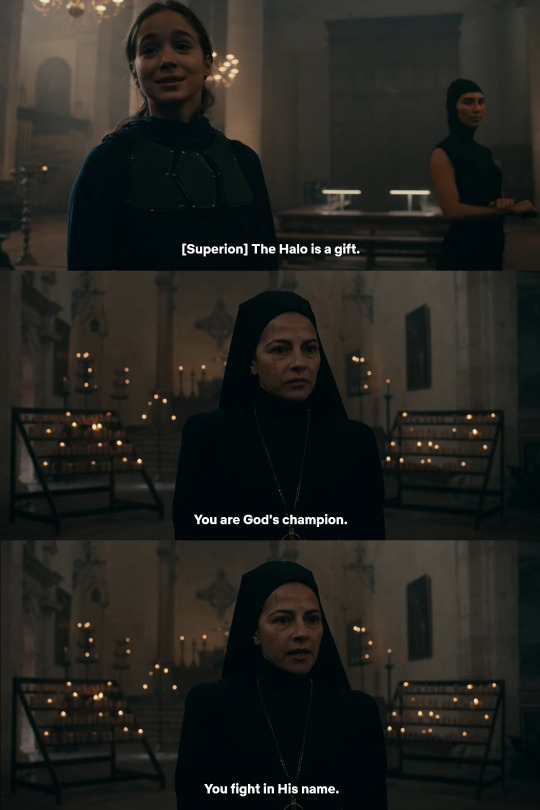

If we are to take a deep dive, it is best to assure the place we're leaping from is stable, so let's do that by starting with the obvious.
The subject in both of these sentences is the same: the Halo. Both of these characters have borne it. Both sentences present the same grammatical structure and answer directly to one another despite the distance in time and space between one and the other's utterances. To Ava, the receiver of these conflicting messages, both claims prove themselves to be ultimately true, for the Halo acts as a gift, in granting her a second chance at a life she never had, and also as a burden, as it imposes on her responsibilities and demands of her sacrifices she would otherwise have never known.
But the show itself openly invites us to dig deeper, so we should not be contented with the obvious alone.
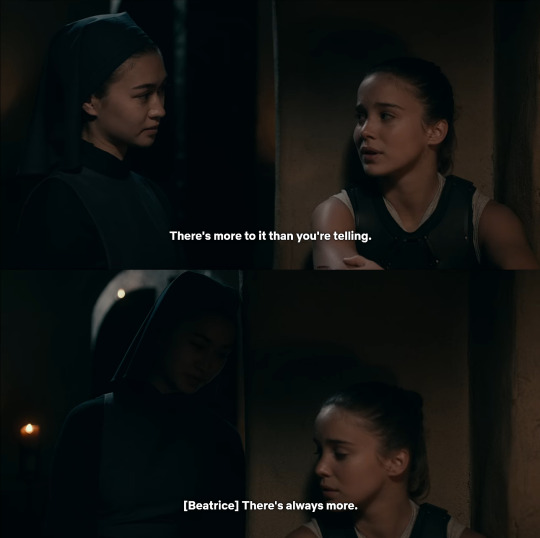
If there is always more, then we must peel back the surface and peek at what is underneath if we are to grasp at least a fraction of the functioning of Warrior Nun in different levels—be it in small scale, pertaining to the characters themselves, or be it in large scale, including how all of it relates to us as viewers in the end.
These two moments of season one are but a fragment of the show’s comprehensive universe, but we will examine them closely to see just how much meaning we can find in them, deceptively simple as they seem.
As mentioned above, the grammatical structure of both sentences is shared between them: “the [subject] is a [noun]”. This could lead to some sort of direct description we associate with the act of definition, of explaining what something is, as in “the pope is a man” or, to use the same reference as Mother Superion and Shannon do, “the Halo is an object”. In fact, had this been the case, we would have been closer to Ava’s own conclusion of the Halo being “a hunk of magic metal embedded in [her] back”, as this is a characteristic anyone could ascribe to it upon examination.
Yet the words used by both former warrior nuns are “gift” and “burden”. If they describe the Halo, then it is not in terms derived from objectively observable traits it possesses (such as it being made of metal), but in a wholly subjective manner. When Mother Superion and Shannon say the Halo is this or that, both imply that it is this or that as relates to themselves. In relaying what the Halo supposedly “is” to Ava, they pre-interpret it for her, infusing it with their own points of view—their beliefs. What they say of the Halo is much more a reflection of who they are than anything the Halo in itself could be.
A) The gift
A gift is, as we know, a present. It presupposes a giver and a receiver, as well as some degree of gratitude on the part of the latter, even if justified by politeness alone.
Mother Superion, embodying the authority of the Catholic church, framed by candles and an altar behind her while making use of short, straightforward affirmations, does not need to clearly state who occupies these positions: we can safely infer that the giver here is God and the beneficiary of this divine benevolence is Ava. A definiteness is patent in the sentences that follow—here is the power of the institution at work, for if Mother Superion starts out by “defining” the Halo, now she defines Ava through it. An inversion takes place, as the woman allows the object to define the woman (as “God’s champion” who “fights in His name��) rather than the other way around. The church, the Halo construct Ava as a subject, subjecting her to certain ideas of what she should be. She is the warrior nun despite having no say in it, not being a warrior and much less a nun.
At first sight, it wouldn’t make sense to interact with Ava in these terms, especially if, by this scene, Mother Superion has already read her file. It wouldn’t be difficult to deduce how expressions crafted with religious colours might impact an audience that does not show any religious proclivities. Furthermore, the tradition of rhetoric has always taught that speakers ought to adapt to their listeners if they wish to get their point across, so either Mother Superion is incompetent at communication, lacking sensibility and skills, or she is making a calculated move—one that is fully supported by her hierarchical position. After all, superiors seldom need to rationally convince their subordinates of doing something given how the latter are compelled instead by power dynamics to get in line—or else.
The strategy doesn’t really work on Ava.
In semiotic terms, we could even argue that there is something confusing happening in this scene—a narrative phase of manipulation (wherein someone tries to get someone else to accept and do something), we could say that it contains hints of both seduction (a positive commentary on the interlocutor—it’s not just about anyone who can be god’s champion, so this is a positive distinction) and intimidation (the threat of negative consequences if the interlocutor doesn’t comply—there is an implied order in the sequence, meaning Ava cannot refuse to be “God’s champion”). Ava might not share in this world-view, but it is what the church and its followers propose: a gift from God is a positive value. Being chosen by God to do something, even fighting and possibly dying in the process, is a positive value. Lilith is standing right there beside them and, at this point, she would surely agree and see nothing of this exchange in a negative light.
Yet Ava isn’t a nun and indeed she does not perceive any of these “honours” as being desirable. Mother Superion’s stance, the image she presents of herself as a strict nun herself when Ava has been mistreated by them all her life, equally gives her no reason to be persuaded, much on the contrary.
The manipulation fails. Ava is told God gave her the gift of life… And that now she is to endanger and potentially lose that very same life as some sort of gesture of gratitude. The logic is unimpressive at best and frankly absurd at worst.
Within the framework of the church, however, it makes perfect sense. Misattributed and misconstrued as it might be, the motto of credo quia absurdum is still pertinent: “I believe because it is absurd”. That a god should grant life only to claim it back through violence is perfectly acceptable if one believes in this god’s unquestionable authority rather than seeing this demand as something ridiculous or cruel.
The very concepts of God, service, battle, duty, blessings only make sense to the faithful, something Ava isn’t. She’s just a puny little individual resisting the pressures brought upon her by a powerful institution.
She and Mother Superion are only speaking over one another, not really having a conversation; Ava doesn’t care to listen to what the church has to say, she doesn’t take it seriously, and the church likewise does not take her individuality, her person into consideration.
However, we would do well to remember that Mother Superion is not simply a mouthpiece for the church—she is also Suzanne, lowly little individual with lowly individual desires and resentment just as Ava.
And, regardless of the effacement of self that monastic as well as military institutions enforce on their members, just as Ava’s subjectivity isn’t neatly negated by direct statements in line with reigning dogma, Suzanne’s own subjectivity also seeps through her words and attitudes. If not blatantly, at the very least there is a remarkable struggle taking place within her, suggested by her use of language as well as her demeanour.
The Halo, after all, defines her as well.
If bearing it is the greatest honour, a mark of God’s favour, if it defines a person, then losing it has an equal power of definition. The distinction it confers on someone is inescapable, for good or ill, and either one dies gloriously as “God’s champion” or one survives it, survives its removal, and is deemed rejected and unworthy by this so magnanimous God. The Halo soaks up all of the positive value ascribed to it—meaning those who lack it adopt a negative one in contrast, be it Suzanne who had it and lost it or even Lilith, who should’ve had it and didn’t.
Still it is considered “a gift”, something given by God… One could say it is a form of grace.
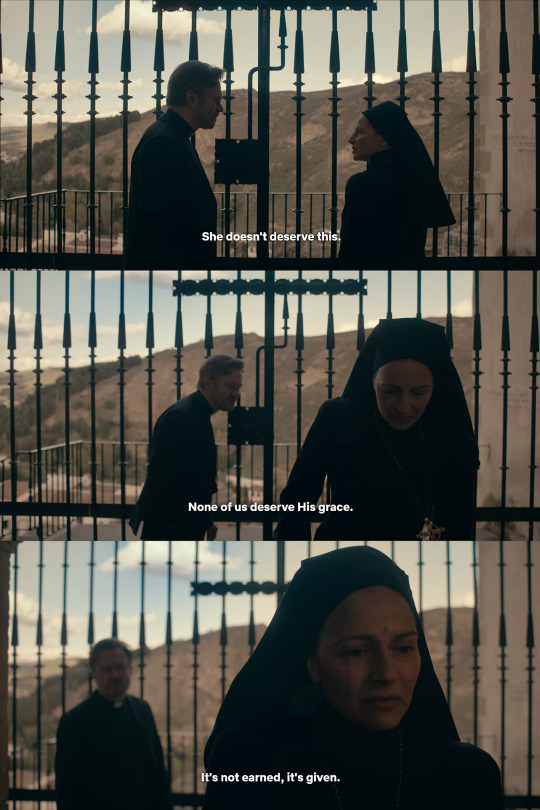
Suzanne’s noun and Vincent’s verb have the same origin, of course, the same stem. Despite the argument between them in this other scene, ultimately there is agreement between the two of them judging by their choice of vocabulary and Mother Superion’s reaction immediately afterwards. If this were not true in some degree, there would have been little need for Mother Superion to correct Ava in the first place, for Ava calls the Halo “a hunk of magic metal”, yes, but she also refers to it as “top prize”, as a reward—which, unlike “gifts”, are meant to be earned, to use Vincent’s comparison. There is a mixture of concepts here.
Without wanting to overcomplicate this text, let us say that ideology is a certain way of understanding the world and that it constructs and is constructed by our discourse, our use of language. One of the functions of ideology is that of attempting to smother contradiction, to smoothen the world’s complexities, simplify them, rationalise them away, however incapable it truly is at accomplishing that given how reality is too complex to be so tamed. Here, then, we see a notable sort of contradiction in Mother Superion’s discourse (in her ideology) that isn’t easily solved: a detail, a problem left out from the thought system. She agrees that grace, in the form of the Halo or not, is given, yet she treats it as if it were earned. This is a crack in the wall; it’s an idiosyncrasy, proof of a subject torn between the different voices that compose her subjectivity, the fragments, the different discourses that, put together, make her up as a whole.
What could be more contradictory than calling something which has scarred her physically, mentally and emotionally a “gift”?
If we create and are created in turn by means of discourse (“you are God’s champion”), if we can only understand and interact with the world when it is mediated by discourses and their correlated ideologies, what would it have meant if Suzanne had assigned another value to the Halo?
The inversion of values would certainly have ejected her from the church. If the Halo, to her, gained negative value, thus allowing her to retain some amount of positive value, her participation in the institution would be impracticable. She would be at odds with the dominant ideology, its structures, its rules… And she would face the resistance Ava faced by assuming such antagonism.
And sure, she might have regained some sort of “freedom”, but what would she have then lost? Resentment or not, there appears to be one central, recurrent positive value, one central desire to most characters in Warrior Nun and it would not be far-fetched to assume Suzanne shares in it herself and is unwilling to part with it.
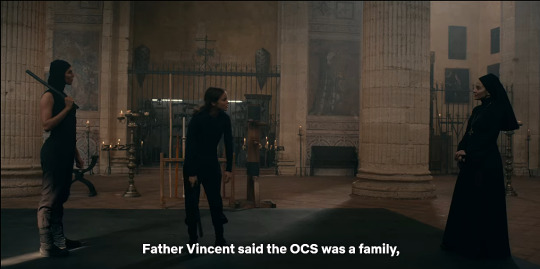
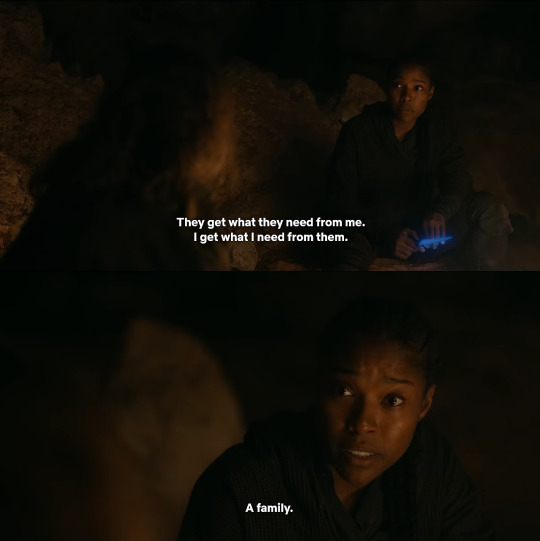


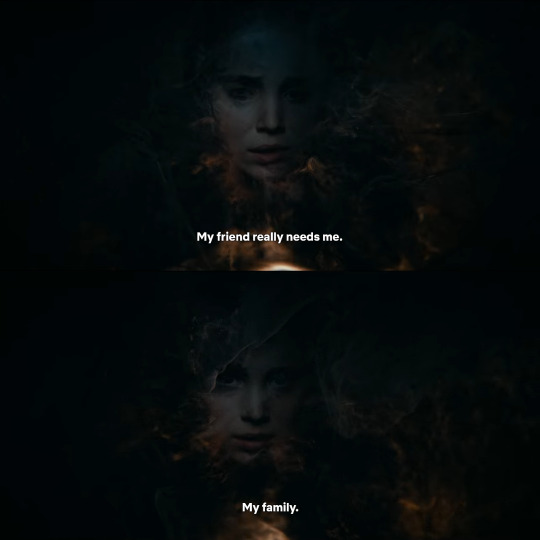

B) The burden
Needless to say that if there is a generous deal of “burden” to Suzanne’s “gift”, there is also some “gift” in Shannon’s “burden”, judging by her mentioning the family she gained through bearing the Halo. Curiously enough, the dynamic of receiving something and paying for it with that very “gift”—Shannon getting a family and losing it by the very same means—is identical to the dynamics involved in getting Ava to accept her fate as warrior nun, by “paying” for the “gift” of life by risking that very same life in battle.
Shannon has received the “gift”—and fulfilled her role to perfection, allowed to thank God for it personally… If the Halo was taken from Suzanne, Shannon is the one “taken” because of it, alongside other ex-bearers.
Here there are no euphemisms. Shannon has lived the consequences of being “God’s champion” until the very end, so she has no need for distorted truths meant to keep things in order, to avoid questioning the principle of order itself which is the institutional view. There is still a struggle (there is always a struggle) as she admits to finding something positive (a family) through her loyalty to the cause even if the cause is what kills her and other women like her. The contrast between Mother Superion’s speech focused on individual responsibility and Shannon’s avowal of how it is “too great for one person to bear” tells us more than enough about how they each envision individuality, community, the possibility of action, who can make it come about—how life and death, different paths, different destinies, inform perception of the same thing.
Their values are inverted.
Mother Superion’s “gift” is Shannon’s “burden”; Mother Superion’s tendency, while alive, to value death (“You fight in His name”) is countered by a dead Shannon’s valorisation of life (“So much promise unfulfilled. So much life unlived. And for what?”) The scenes are in direct opposition to one another, they respond to one another as mirrored images.
So much so that the reply is not merely linguistic, hidden away in dialogue, but quite evidently displayed in visual terms as well. A mirror offers us reflections that are inverted—left in place of right, right as left—and so are these scenes inverted in relation to one another: in the moment of saying the sentences we’re concerned with, Mother Superion and Shannon stand in much the same place. If we do not notice, it is because the camera pans around in different angles—with the former, we watch the scene from a point at Ava's left, while the latter is shown from an angle at her right. We are literally treated to reflected images, seen from opposite points of view.

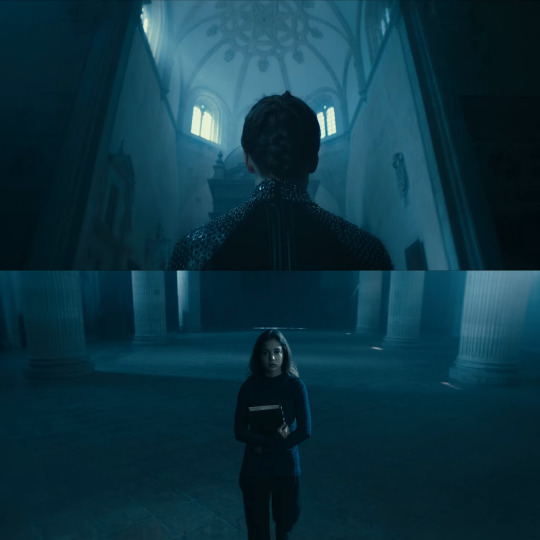
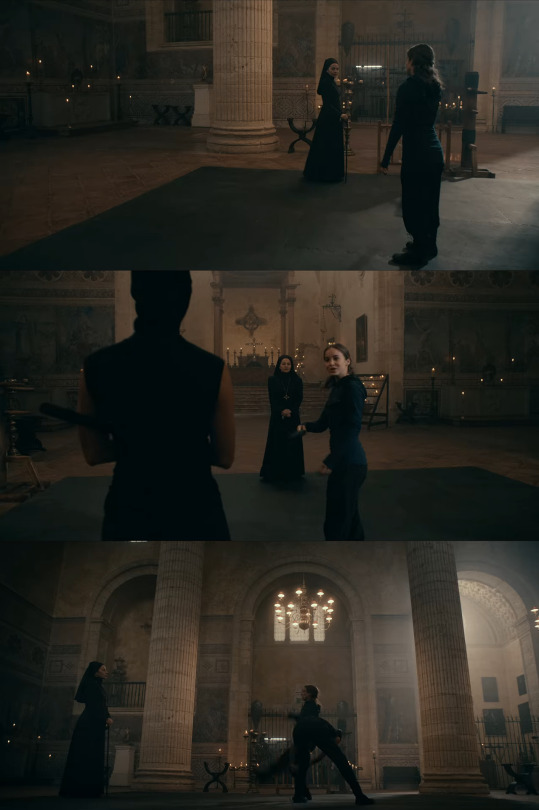
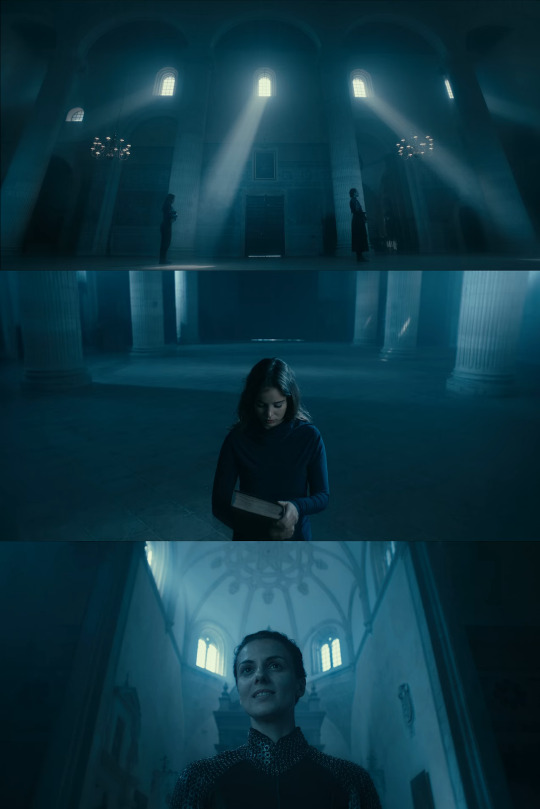
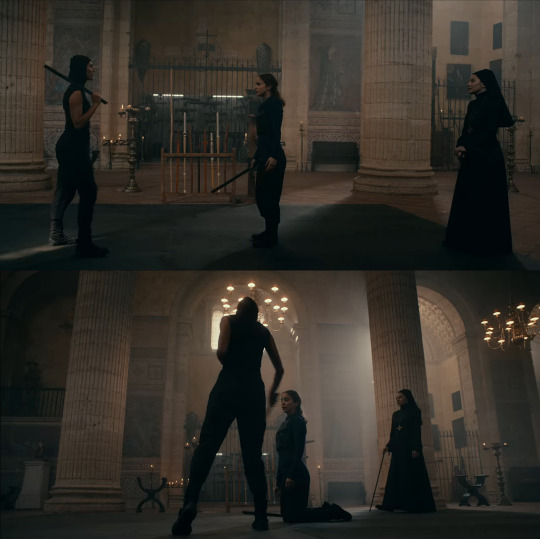
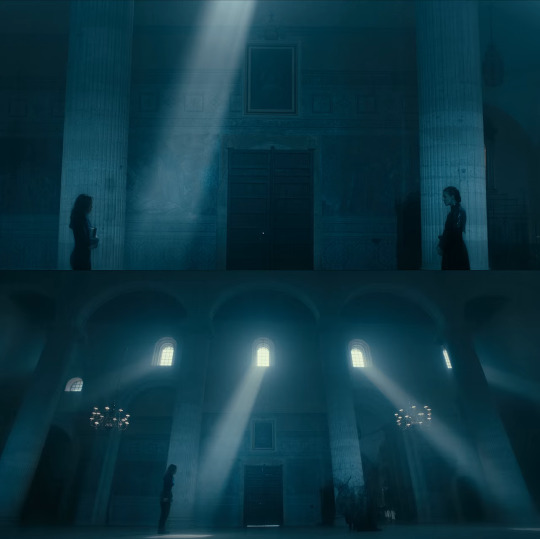
Colour, too, guides our reading of both scenes set side by side. With Mother Superion, we are in the realm of the church and its associated earthly tones as established throughout the first season, whereas Ava’s vision of Shannon paints the dream church in a shade of blue. Blue is, of course, the hue which had been mostly tied to Jillian Salvius, to ArqTech, to science. With science comes the concept of reason, as opposed to the sepia haze of faith.
Mary is also drawn against a backdrop of bright blue sky when she is investigating the docks and relying on her reason rather than her faith concerning Shannon’s death.

Shannon’s opinion on the Halo might be just as subjective as Mother Superion’s before her, but it is filtered through personal experience and observation, through reason rather than blind belief in a mission.
Yet we are forgetting something. Ava, having died already, claims there is nothing on the other side. If that is so, why is she meeting Shannon now? And why is this meeting taking place in circumstances that reflect previous events in an inverted manner?
As dreams often reuse what we have lived when awake, re-rendering our memories, transforming them, so it is possible that Ava is not having a vision but a dream—that she is talking not to Shannon, but to some facet of herself, Ava, manifesting as Shannon after connecting with her memory through the warrior nun book.
As Ava clings to it and the knowledge it affords her, it would make sense for her conscience to finally figure out a proper retort to what she heard of Mother Superion in that earlier moment, a retort fuelled by new information and by her own reasoning. At the very least, it would be more plausible to consider this hypothesis than to assume her vision of Shannon is a real communication with her spirit granted by the Halo, for, if we are witnessing a new phase of manipulation, then the message being transmitted this time concerns the Halo’s “lifecycle” itself—and how it must be brought to an end. If it is sentient as some characters believe, why would it let Ava meet Shannon and be exposed to the idea of working against the Halo’s own interests of perpetuation?
After all, the implications behind Shannon’s words are evident: again, if the Halo also defines the woman, then it defines sister Shannon, sister Melanie and all other warrior nuns going back to Areala with one word which will soon apply to Ava and whomever follows: that word is dead, crushed under the burden.
And this time, the message, a sort of compassionate provocation (“a burden too great to bear”—even for you), hits its mark, inspiring Ava to end the tradition and be the last warrior nun.
We are not in the semantic field of religion, even if it is there, in the background, being answered to; here we are not speaking of God or battles fought for this distant general in the sky, but of family, of women slaughtered in the name of a mission. This is no longer some ethereal question but an immediate concern. Whether this is Shannon or Ava herself subconsciously masquerading as Shannon to facilitate her own “awakening”, the point gets across now that it is transmitted in language that makes sense to Ava, now that there are common values between speaker and listener.
One could even hypothesise that, at this point, Shannon being a former warrior nun lends credibility to her words in Ava’s mind as she is a woman experienced in this role Ava is supposed to play.
If so, we can also understand the bridge of empathy that is built between Ava and Mother Superion later on when it is revealed that Suzanne, too, was a halo bearer and that she, too, has carried this “burden”. Both forge new understandings of one another through this common background and a personal exchange that is nothing like their first encounter—when the “gift” is said to have rejected the older nun, when its “burden” is divulged to Ava.
As Ava recognises Shannon, so do Ava and Mother Superion eventually recognise one another as well—so do they begin to comprehend how they did carry similar values, only obscured by their dissimilar ideologies and their resulting language use. If no other, then the value of family is what binds them together through Suzanne’s new disposition to embrace all of her sisters and Ava’s newfound conduct in considering them her sisters to begin with. They come closer in the catacombs and, at last, meet halfway by season two.
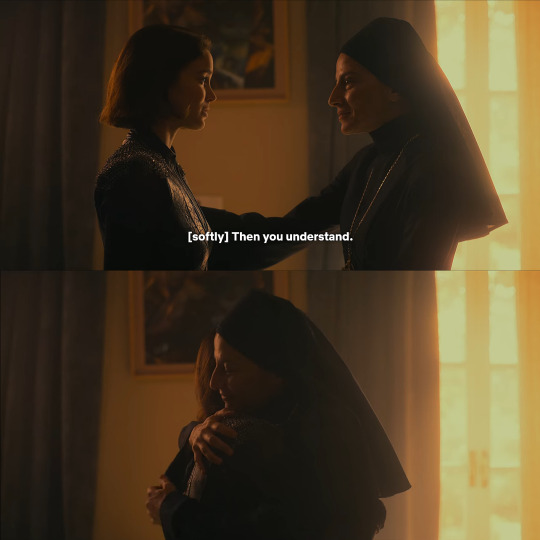
Yet we, the viewers, as touched by this miscommunication that ends well as we may be, after all of this talk of gifts and burdens, we remain none the wiser on what the Halo actually is.
C) The energy source
As previously exposed, we are kept in the dark because most sentences that speak of this iconic object in the series are subjective, focused on the characters’ own relationship to it or their ideas about it rather than any substantial data on what it might truly be apart from a “hunk of magic metal” currently in Ava’s back.
Perhaps because we spend so much time with the nuns, satisfied as they are with the logic of plain belief instead of concerned with tangible, provable things that can or should be explained. The most we get is the information on how the Halo is some kind of weapon, an amplifier attuned to the bearer’s body and soul.


Enter Jillian Salvius.
While her understanding of the Halo is admittedly insufficient, her research on it limited, her available vocabulary and scientific knowledge too slim (!) to encompass such an item, she does not say something like “the Halo is a mystery” or “a conundrum” as she says of Lilith later on. It would be true, just as it being a “gift” or “burden” is true considering those who called it thus, yet Jillian uses another sort of language instead.

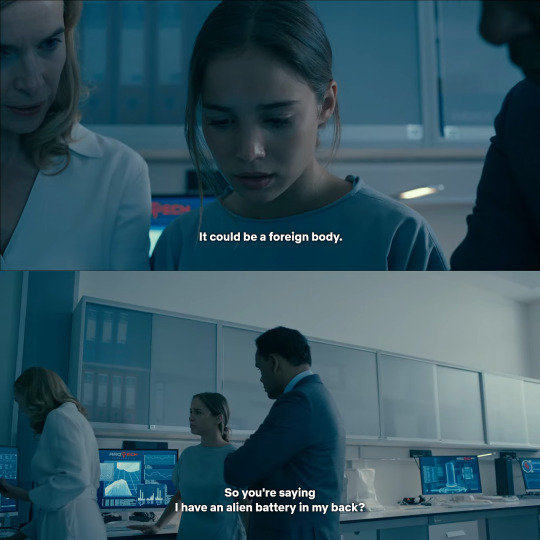
Being a scientist, doctor Salvius opts for what we consider to be appropriate scientific modes of speaking, that is, by creating an impression of objectivity. It is not her personal reaction or opinion of the Halo that she offers, but whatever traits she can see or learn of in that moment: an energy source, an object that defies physics, a foreign body of undefined material. Ava “translates” this as being “an alien battery”, but the fact is that we are served a definition of the Halo unlike those we had before. It isn’t much, but for once we are not given a character’s personal interpretation of it…
Or so it seems. We none of us are capable of being fully objective, for none of us can rid ourselves of our selves—Jillian posits the Halo as an energy source, which seems innocent and impartial enough, but soon afterwards we understand what that means to her.
In themselves, the words “energy source” don’t carry many other connotations. Yet, for Jillian, these words that seem so neutral and “scientific”, so clear cut, do not sustain the facade of objectivity. She has spoken of energy before, it is an active component of her research, a common word in her lexicon; to Ava, “energy source” is “a battery”, but to Kristian and Jillian, who are part of ArqTech, who know what goes on within its walls, these words automatically acquire another meaning.
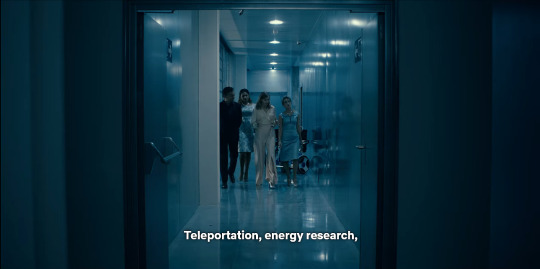

Yes, that of a battery, but one with a very specific purpose. Under the guise of neutral discourse, a very personal interpretation of the Halo, just as if it were a “gift” or “burden”, lies hidden. It is an energy source—one that doctor Salvius can potentially use to power her contraption. It is a “solution”, perhaps even a “gift”, of circumstance if not of god.
And it, too, defines Ava despite herself. When it fails, Jillian says she was wrong about Ava, not the Halo, thus conflating the two.
In the end, even she who might well be the smartest character, the one most closely connected with science and concrete knowledge, cannot guard herself from letting the unsaid (or “unsayable”) slip through her lips. She, too, in spite of her apparent objective language, exhibits a subjective kind of relationship with the world around her, influenced by the ideologies that cross her being.
D) Ending thoughts
Perhaps, when all is said and done, we are never truly able to follow that maxim we’ve seen more than once on Warrior Nun.

Perhaps we simply cannot think or act if we do not perceive things as at least partially related to ourselves.
It is not necessarily a bad thing, though, as long as different views can coexist, as long as they do not trample one another, as long as one person or group don’t elect themselves as the owners of truth, attempting to eliminate all who do not follow them as Adriel tried to do. In a democracy, in a place and a moment in history where there is freedom of thought and creed and speech, the phenomenon of various voices competing for the spotlight, taking turns under it is normal and healthy.
Warrior Nun gives us a fascinating insight on the multiplicity of voices that compose a society, even if there are elements of it which seek to suffocate those voices. It is a microcosm where different ideologies, through language, are confronted with one another, where they struggle to make sense of things—and where each of those points of view over a given subject might carry a morsel of truth. The Halo is a piece of metal and a gift and a burden and an energy source; none of these ideas or perceptions necessarily exclude the other, none is “more correct” than the other because, if so, then the question would be: as regards which character?
To Ava, at least, it is all these things and maybe more.
There are attempts to implant a hegemonic interpretation of facts. The very story of Areala, Adriel, the Halo’s trajectory along the centuries, how this is “the way it has been for one thousand years” is a strategy to cement a singular view. The repetition, the constant reworking of tradition, telling this story over and over with each warrior nun… That is the church at play, ideology trying to fill in any gaps, keep things as they are, conserve them and the structures that organise them, guaranteeing that things have one certain sort of sense and not another, one value, one meaning.
But life is not stagnant and people are not all swallowed whole by ideology even when they subscribe to it willingly, as a member of a church would. There are always things that cannot be explained, things that are beyond the scope of ideology—contradictions, pesky little details that escape the invisible goggles with which we look at reality. The truth is that it is far more complex than we can contain it with a few buzzwords, man-made or divine. There is always another side, always a reply, a constant dialogue between our different ways of seeing, understanding, being and, therefore, speaking.
A more visible example comes from those scenes in season two where Yasmine and Adriel are both telling the exact same story, only through their own perspectives, interpreting it in their own ways.
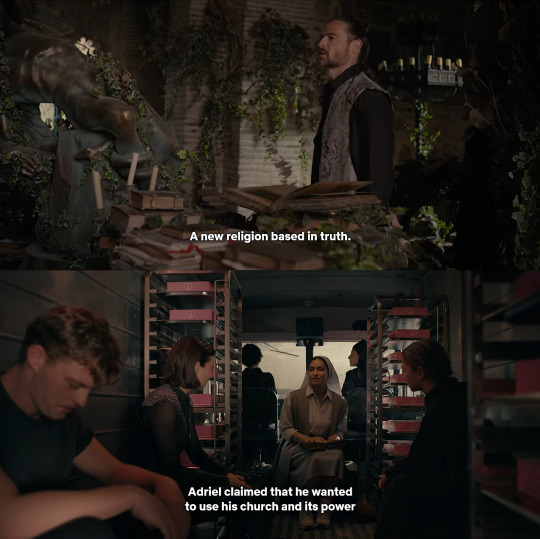

The show provides many opportunities to see how varied human voice can be, how the point of view of whoever is telling the story bears a mighty influence on the narrative, whether consciously or not, malicious or not. That, in turn, may inspire us to look around us, in the real world; to look at how we are representing things, others and even ourselves as well as how others represent us through the words we use.
This is not an exhaustive study, long as it is. As said before, it is but a glance at two scenes, two little lines of dialogue which are, however, intimately connected with others, with the stuff of the entire show—with the stuff of life. We could write more on how possessive pronouns and other sorts of phrases with the idea of the Halo “belonging” to someone or being “owned” by someone are used, just to remain in the area of discourse about the Halo alone.
But the present text has given all it had to give and its author does not wish to be a burden on her readers any more than she already has been.
#warrior nun#mother superion#ava silva#sister shannon#jillian salvius#look i tried my best not to throw jargon at you#it is strange for me to NOT mention bakhtin foucault pêcheux ducrot althusser greimas courtès perelman olbrechts tyteca & co#but the theory is there working beneath the text. i didn't want to scare anyone with the whole academic stuff#so i have tried all i could to use it without mentioning it directly and guarantee that anyone can understand what i've written#you will tell me if i have managed to convey my message or not#i hope i have. i don't like using a word like ideology without defining it but i want to trust in readers' intelligence#anyway. discourse analysis with some semiotics thrown in. i hope you have as much fun with this as i did!#i chose these two moments because i found them pretty cool#but we could talk about how language works in warrior nun for years probably#how it ties everyone together despite differences in understanding how it appears and reappears with new meanings#anyway I'VE SPOKEN ENOUGH#analysis and similar#exercises in observation
145 notes
·
View notes
Text
Excerpt from this story from Inside Climate News:
A legal fight over an 88-mile proposed railway in Utah has set the stage for the U.S. Supreme Court to decide how federal agencies evaluate the environmental impacts of projects requiring their approval, a decision with the potential to drastically shift how projects are permitted across the nation.
The Supreme Court is set to hear oral arguments in the case, Seven County Infrastructure Coalition v. Eagle County, on Tuesday, Dec. 10. It’s the latest development following a U.S. Court of Appeals decision last year that overturned a federal agency’s approval of the railway after a lawsuit from environmental groups and a Colorado county along the project’s path. The appeals court found that the review failed to evaluate the downstream impacts of the project.
A coalition of seven Utah counties appealed that decision, and the Supreme Court will now decide how far federal agencies can evaluate the impacts of a project under the National Environmental Policy Act—in this case, the immediate area of an 88-mile railway or beyond.
The Uinta Basin Railway would connect the oil fields of northeastern Utah to the national rail network running directly alongside the Colorado River for more than 100 miles as it makes its way to refineries on the Gulf Coast. If built, the new railway could quadruple the production of the region’s waxy crude oil. Supporters argue it would revitalize the region’s economy, but opponents say it would worsen the region’s already poor air quality, affecting locals and those downstream, including in neighboring Colorado and along the Gulf Coast, where the crude oil will be refined.
“The primary beneficiaries of the railway would be a handful of CEOs of oil companies who have already manipulated Utah lawmakers into giving them public subsidies, whose objective is to exhaust this unique oil resource as fast as they can, to make as much money as fast as they can,” said Dr. Brian Moench, president of the Utah Physicians for a Healthy Environment, one of the groups opposing the project. “The cost, literally and figuratively, would be borne by everyone else and future generations.”
The Supreme Court’s decision will not determine the final fate of the railway. The appeals court ruling found that the federal Surface Transportation Board in its permitting of the project also violated the Endangered Species Act and the Interstate Commerce Commission Termination Act. What the high court’s decision will do, however, is likely to dictate the scope of NEPA analyses for years to come. Weighing in to try to shape that opinion is a growing chorus of industry groups, state attorneys general, law professors and advocacy groups.
11 notes
·
View notes
Text
Christopher Wiggins at The Advocate:
A public library in Virginia that successfully pushed back against book bans last year has been taken over by Republican elected officials despite objections from the local community. In a contentious move, the all-Republican Warren County Board of Supervisors voted 4-1 early Wednesday morning to assert greater control over Samuels Public Library, the institution lauded as Virginia’s 2024 Library of the Year and beneficiary of a substantial $500,000 grant from the Mellon Foundation. The Washington Post reports that on Tuesday evening, nearly 100 residents from diverse backgrounds—including grandparents, home-schoolers, veterans, teachers, farmers, and students—attended a six-hour public hearing in Front Royal, about 50 miles from Washington, D.C. Their unified stance was to defend Samuels Public Library from what they believed was government overreach by the Warren County Board of Supervisors. Despite overwhelming public support for the library’s existing governance, the Republican supervisors advanced their plan to establish a new county-appointed library board with direct oversight over Samuels’ policies and budget.
Supervisor Richard Jamieson, who led the initiative with a comprehensive 58-page “2023 Library Debrief and Research” report, contended that the current 15-member nonprofit trustee structure of Samuels Public Library no longer aligns with taxpayer interests and lacks sufficient oversight. Joined by Supervisor Vicky Cook, who had previously supported the library’s inclusive stance on LGBTQ+ titles, Jamieson argued that a shift in governance was necessary to ensure fiscal responsibility and operational efficiency. The takeover threatens to displace Samuels as the primary library service provider by June, the end of the fiscal year. In response, the Post reports that Melody Hotek, president of Samuels’ board of trustees, announced that the library is exploring all possible options, including seeking private funding to achieve complete independence from county oversight.
The Advocate previously reported on the fierce 2023 showdown when the conservative group Clean Up Samuels launched a campaign to remove LGBTQ-themed books from the library’s youth collections. The initiative sparked heated public debates, led to the resignation of the library director, and imposed significant financial strain as the library sought legal and public relations support to navigate the crisis. Despite these formidable challenges, Samuels Public Library survived and thrived, earning accolades for its unwavering commitment to inclusive and diverse literature. Despite the supervisors’ assertions of fiscal prudence and enhanced oversight, the community’s support for Samuels Public Library remains unshaken. Chip Stewart, a resident and fervent supporter of the library’s independence, launched a Change.org petition to thwart the Board of Supervisors’ actions. “Things were looking good for the Library’s future,” Stewart told The Advocate in an email. “But now, the trouble is returning.”
The Warren County Board of Supervisors in Virginia voted 4-1 to take over the Samuels Public Library in Front Royal, VA. The library in the past had successfully fended off right-wing extremist requests to remove LGBTQ+-themed books from its library.
#Virginia#Libraries#Book Banning#Book Bans#Samuels Public Library#LGBTQ+#Anti LGBTQ+ Extremism#Clean Up Samuels#Warren County Virginia#Front Royal Virginia
9 notes
·
View notes